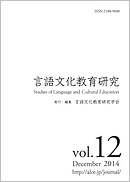Volume 12
Displaying 1-19 of 19 articles from this issue
- |<
- <
- 1
- >
- >|
Preface
-
2014 Volume 12 Pages i-ii
Published: December 05, 2014
Released on J-STAGE: July 24, 2015
Download PDF (931K)
Special issue on “New Horizons of Action Research”
-
2014 Volume 12 Pages 1
Published: December 05, 2014
Released on J-STAGE: July 24, 2015
Download PDF (911K)
Aims and Background
-
2014 Volume 12 Pages 2-3
Published: December 05, 2014
Released on J-STAGE: July 24, 2015
Download PDF (935K) -
2014 Volume 12 Pages 4-5
Published: December 05, 2014
Released on J-STAGE: July 24, 2015
Download PDF (937K)
Special Contributions
-
2014 Volume 12 Pages 6-13
Published: December 05, 2014
Released on J-STAGE: July 24, 2015
Download PDF (1448K) -
2014 Volume 12 Pages 14-28
Published: December 05, 2014
Released on J-STAGE: July 24, 2015
Download PDF (1254K) -
2014 Volume 12 Pages 29-48
Published: December 05, 2014
Released on J-STAGE: July 24, 2015
Download PDF (1039K)
Articles
-
2014 Volume 12 Pages 42-87
Published: December 05, 2014
Released on J-STAGE: July 24, 2015
Download PDF (1294K) -
2014 Volume 12 Pages 88-101
Published: December 05, 2014
Released on J-STAGE: July 24, 2015
Download PDF (994K)
Forum
Book Review
-
2014 Volume 12 Pages 102-110
Published: December 05, 2014
Released on J-STAGE: July 24, 2015
Download PDF (1080K) -
2014 Volume 12 Pages 111-114
Published: December 05, 2014
Released on J-STAGE: July 24, 2015
Download PDF (1028K)
Essay
-
2014 Volume 12 Pages 116-124
Published: December 05, 2014
Released on J-STAGE: July 24, 2015
Download PDF (995K)
Regular contents
Articles
-
2014 Volume 12 Pages 125-147
Published: December 05, 2014
Released on J-STAGE: July 24, 2015
Download PDF (1440K) -
2014 Volume 12 Pages 148-166
Published: December 05, 2014
Released on J-STAGE: July 24, 2015
Download PDF (1236K) -
2014 Volume 12 Pages 167-186
Published: December 05, 2014
Released on J-STAGE: July 24, 2015
Download PDF (2983K) -
2014 Volume 12 Pages 187-197
Published: December 05, 2014
Released on J-STAGE: July 24, 2015
Download PDF (1263K) -
2014 Volume 12 Pages 198-220
Published: December 05, 2014
Released on J-STAGE: July 24, 2015
Download PDF (2775K) -
2014 Volume 12 Pages 221-240
Published: December 05, 2014
Released on J-STAGE: July 24, 2015
Download PDF (1183K)
Editorial Board
-
2014 Volume 12 Pages 243
Published: December 05, 2014
Released on J-STAGE: July 24, 2015
Download PDF (828K)
- |<
- <
- 1
- >
- >|
